
Smart Factory: Manufacturing in Industry 4.0

LeSoft
Manufacturing in this era has changed magnanimously. It is not carried the way it used to, as the latest innovations and emerging technologies have taken over traditional manual manufacturing processes.
Industry 4.0, or Industry Revolution 4.0 as they call it, is revolutionizing how companies manufacture, improve and distribute their products to the masses.
These days, manufacturers are integrating new technologies, such as the Internet of Things (IoT), cloud
computing, and AI, into their production facilities and operations.
The massive digital disruption and evolution of technologies have shifted manufacturing to smart
manufacturing, leveraging the benefits of Smart technology.
This is coined as Smart Factory, where manufacturing and manufacturing-related activities are carried out
digitally, resulting in manufacturing processes in a streamlined format.
Recently conducted research suggests that the global market value of Smart factories will reach USD 130
Billion by 2026.
Factors such as the demand for innovative technologies in the manufacturing industry contribute to
innovative factory market value growth.
Furthermore, rising demand for automation and robotics is fuelling the growth of the smart factory market,
pushing companies to utilize the benefits of digitization.
However, the digitization of manufacturing has reaped several unparalleled advantages that have uncovered
the massive potential of the manufacturing industry.
Combining the digital, physical, and virtual worlds has created unique opportunities for growth and
productivity while reframing the competitive landscape with smart digital products and new service
models.
It has further led to benefits such as machinery becoming as much as 35% faster and 30% more efficient
through Industry 4.0 capabilities,
The embedding of digital tools and technologies is not just an achievement of organizations as a whole but
also the benefits that human beings have gained from the outcomes and outputs of Industry 4.0 by
implementing and guiding the change.
It has resulted in top-down management support inside manufacturing companies and team capacity-building
to attain the practical and cultural changes needed to see the digital transformation.
The utilization of digital tools and technologies won't be feasible if the groundwork needed for
infrastructure supporting the digital is not utilized correctly.
Mass customization provides a low-hanging opportunity to the masses.
With the deployment of Industry 4.0 technologies, manufacturers make gains by introducing degrees of
product variance with high throughput and consistent quality and closing the loops enabled by
sensor-based, inline quality inspection and flexible routing, scheduling, and performance management all
contribute to this, along with the extension of automation to final assembly.
"Fox ERP for Manufacturing" is one such ERP software that streamlines the manufacturing business
processes in one go.
From batch numbering to managing stock levels to generating automated billing processes, it digitizes
massive manufacturing processes in digitally driven ways.
"Fox ERP for manufacturing" comes with a "Do it yourself" mode of implementation, that enables organizations to utilize its technology and bring out the capabilities of ERP.
Conclusion
Digital is the new normal, and so are the ways of doing business. With the rising advent of digitization,
manufacturing organizations are quickly adopting Smart technology and digital infrastructure to bring
value to the entire manufacturing value chain.
In the days to come, the adoption of digital in manufacturing will only increase, providing organizations
with unique and enhanced benefits.